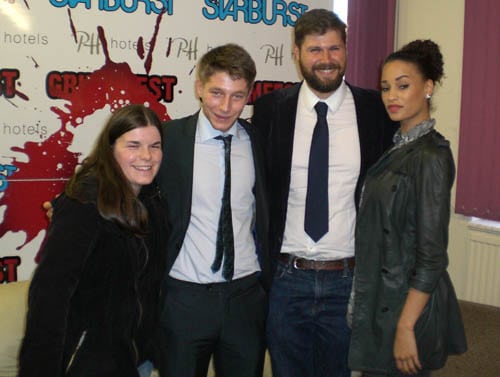
Back at Grimmfest 2014 film festival at The Dancehouse in Manchester, I had the great fortune of interviewing THE FORGOTTEN director and co-writer Oliver Frampton along with lead actor Clem Tibber and lead actress Elarica Johnson.
To celebrate the release of The Forgotten, on DVD in the UK from 2nd May 2016, read about what it was like to create the film and what attracted Clem and Elarica to the project.
What inspired you to create the film, The Forgotten?
Oliver: James, my co-writer, and I are really big horror fans and love ghost stories. We got our thinking caps on about what kind of film we wanted to make together and a ghost story was at the top of the list.
Clem and Elarica, what attracted you to the script?
Elarica: I’d never received a script like that before. You see horror scripts and it’s gory. It’s very rare you come across a ghost story and one that’s so well written and that is so real. It’s set on a council estate – I grew up on a council estate – and it’s all about these noises. It’s something we all kind of experience when we’re younger, hearing noises next door or under the bed. It was really nice to receive a script like that.
Clem: Honestly, she’s said it all there really.
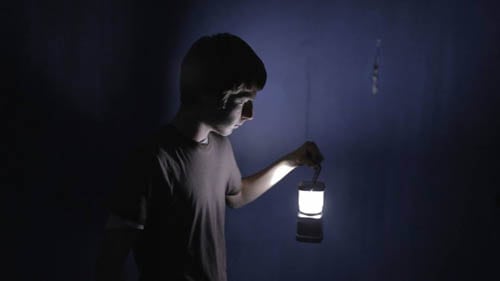
Have either of you worked on horror or thriller movies before?
Elarica: Yes! [laughs] It’s funny because we shot this (The Forgotten) quite a while ago…
Oliver: It was October 2011.
Elarica: Yeah, it was a little while ago, so last year (2013) I shot a horror film… well, it’s like horror. I’m not sure exactly where it fits in the genre but yeah, it’s a horror film and that’s supposed to be out this year. I don’t know where it is or what it’s doing but it’s supposed to be happening. It’s quite weird to have them both happening around the same time. They’re completely different.
Is horror a genre you like working in and did you prank scare each other on set?
Clem: There really wasn’t much pranking going on but it was such good fun.
Elarica: It was but there were moments were we’d be together doing scenes and stuff and it’s that freaky feeling… Nothing’s actually happening. They’d cut and everyone’s fixing tapes and stuff and we’re just sat there, Clem and I, and we’re like “Urrrgh”. [laughs] It was the aura of the whole thing. I think all of us had frightening moments though, didn’t we?
Oliver: Yeah. What’s weird was, we shot at an actual abandoned council estate. There’s quite a few in London, weirdly, like six or seven, and they sit there waiting for somebody to tear them down for re-development and it’s a really strange place because, this is what kind of got me and James really excited, you can walk around and there’s all these boarded up flats but they have lives that have gone on in them and now they’re just empty. We were given a set of keys and we could go in and film wherever we liked. You go in and can kind of feel what lives were there before. It’s really strange. Deaths and births, relationships and arguments. All that stuff is just gone now. It’s really strange.
Elarica: I’ve never thought of it like that before.
Oliver: During the shoot, I was not massively freaked out and scared but conceptually, when you think about it, it’s really odd. These places should have life and they’re designed to allow us to walk around the walkways and concourse space. It’s supposed to be played in and lived in with kids running around and stuff. We didn’t get any of that. It’s really weird.
I suppose it’s like when you see movies shot in old psychiatric hospitals where peopled have occupied the building before but now there’s no-one. There’s an emptyness about it that feels wrong.
Oliver: Like Session 9. They kind of went in, they’d not decorated it or anything.
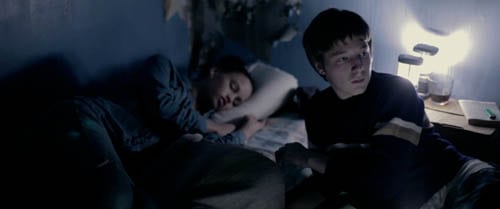
The estate that you worked on had flats with peeling wallpaper and the like. Did your team work on the interiors or were they already like that?
Oliver: All of it was designed. The flats, when you go in them, some are carpeted and some are wooden floors and stuff. They were all actually quite nice living spaces, you know.
So no blood splattered all the over the wall already for you? [laughs]
Elarica: What Oliver was saying before about us not getting to see the interiors. I didn’t know that you lot had already seen it before me, didn’t you.
Clem: I was told to keep it a secret from you. I was quite shocked when I went down there, to be honest. I’d seen the flat next to it and it was already pretty gritty then. Then seeing the next door flat with its red walls. That was the freakiest part of that.
Oliver, you’ve written TV episodes before. How was it going from writing episodes to writing a feature length film?
Oliver: It’s really different. I’ve worked in television quite a lot and the challenge with TV is that a lot of the time it’s ongoing and so you have episodes which have little story structure and a beginning and an end and it’s designed to go on to hook you into the next episode. With film you’re completely closed ended which is actually really nice.
We’re really big on story and we were determined to do something that wasn’t just set up in an interesting place and play stuff out and everyone dies at the end and it starts again. We weren’t interested in telling a story like that. We really wanted to tell a story that was designed with an ending that would kind of surprise you and was something a bit different and everything feeds through to deliver on that ending. So yeah, it was really good. It’s different, like I say.
Were you inspired by any real life people when writing the characters?
Oliver: Not really. Other than the kind of people you just meet, hear on a night bus or kind of bump into. London is like a weird city. It’s really diverse and really mixed and it doesn’t really matter where you live or what your lifestyle is, you’re going to bump into those people. If you have your ears open, you’re kind of sensitive to personalities and different people, then they’re all around.
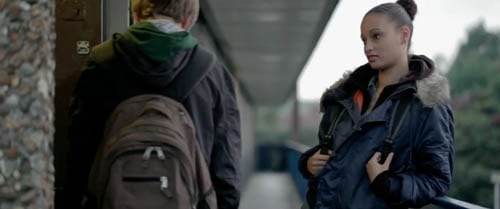
Which was the most difficult scene to film?
Clem: I don’t know which was the most difficult but I can tell you which was most funnest scene. [laughs] The scene where I had to hit Shaun (Dingwall) over the back of the head with a crowbar, that for me was the funniest scene. I’d never really done any stunts or anything. We got a stunt co-ordinator in that day so we sort of made a day out of it. I had a lot of pads on my shoulders and stuff for being thrown into the wall. I had quite a lot of fun filming it.
Oliver: The stunt co-ordinator had worked on Indiana Jones and loads of cool stuff so half the time we were sitting there going “tell us a story”.
Clem: He told me one about a film though where they had a load of explosives in a hole… I can’t remember how the story ends…
Oliver: But it was a good story?
Clem: It was!
[laughs]
Elarica, which was your favourite scene?
Elarica: Erm…
Oliver: So many to choose from!
Elarica: I know! There really were. Overall, filming the whole film. We did it in such a short amount of time but it was really easy in a sense that everybody knew what they were doing and everybody wanted the film to be made. We all believed in the script so much that the day-to-day wasn’t like, “oh, I can’t wait to get this scene done” or “we’ve got this to do”. It just had this really nice flow to it. We did have a scene, Clem and I, and it was just funny because everybody thought it was hilarious. It was the scene where we were making the lung. They were laughing, we were laughing, all of it was completely natural. It was really fun to do that bit, wasn’t it?
Clem: Yeah, that was pretty funny.
Elarica: It was really good. Oli kind of lets you do what you need to do and he’ll stop once he feels like we’ve finished. We get given this space to do our job and that’s really nice because we come away with something we’re proud of, he’s proud of and it all kind of works together.
Oliver: My memory of that scene was that I had to show you guys how to do a lung. [laughs]
Elarica: I had no idea. There was that moment of me going “errrrr…. what?”. “Oli, why do you know what a lung is” [laughs]
Oliver: None of it was real. It was all smoke and mirrors… and smoke. [laughs]
How long did the film take to shoot?
Oliver: So it was really quick like Elarica said. We shot for fifteen days. I’m used to working really quickly on television stuff but that’s really, really fast. I know I’d go home every night with a good schedule for the next day and be going “oh my God”. It’s like pages and pages and pages of stuff and every day there’d be some scenes that are really emotional and some really scary and then some funny. We were having to work really fast and across a lot of emotional plains but it was really good and like Elarica said, we all got into it. It was great.
My immediate memory was the first nine or ten days when we were shooting on the estate, we had the run of the place but we also had like a council cafeteria room that we were all based in. Everyone just divided up the space so you’d have costume in one area and the D.P. guy was taking footage off the camera and that was always going on. We a;sp had make-up somewhere and there were people preparing food and tea and stuff. It was like a film school. It was really cool. That was not by designers, it was by working within the space. It was really good fun and that was like the first wrap. I think it kind of bonded everybody as a group. I’m quite big on this because I don’t think you need to work and for it to be painful. I don’t think it should be, because we’re all there because we want to make a film. With this project, everybody kind of had to buy into it because it was low budget. It shouldn’t be like me shouting going “oh no, it’s not right!” and “do this, do that”. It should be really collaborative and positive. Hopefully it was.
Elarica: YES!
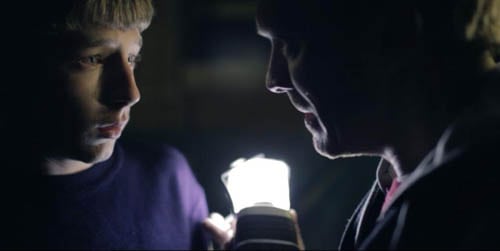
Being the co-writer of The Forgotten as well as the director, were there any moments during the shoot where you’d re-write a scene on the fly if it didn’t work or tweek something slightly?
Oliver: Not very much. There’s stuff cut from the film actually that was scripted which is interesting because there’s a kind of sub-plot almost about Carmen, Elarica’s character, which happens in the latter stages of the film which we omitted. It just wasn’t necessary and it kind of slowed things down and what you want from the film is for it to be like a straight line building up to its climax. In the scripting process it was designed to be a breather but it didn’t need a breather and you can’t tell that until you sit down with a camera and watch it and think.
I remember there were a couple of tiny things like when you were looking through the paperwork and stuff like that but there wasn’t anything major. We didn’t re-write on set or anything. It was the sort of thing where basically, because it was supposed to be so naturalistic, if lines changed a bit or if they were fluffed but kind of intentionally fluffed and it sounded good, then it was fine.
Did you bring any part of yourselves to the characters you played or were you inspired by anyone you knew?
Clem: For me, honestly, I feel like I can relate to Tom quite a bit anyway but I didn’t really bring anyone else I knew into it. When I first got on set, I felt I was quite shy and I didn’t know anyone and then as the film progressed and we started filming the end scenes towards the end of the shoot…
Oliver: It was all chronological…
Clem: Yeah. I did feel like that when I got to know everyone better, it felt like I could sort of try and grow with it.
Like your character in the movie…
Clem: Yeah.
Oliver: It’s really strange because it was shot in 2011 and Clem’s grown up these past years. You’re right, when we were there, it was definitely intimidating. It was the right way round. The first scene which we shot was Carmen’s first scene of the film, where you were walking onto the estate, and this was by design. It was pretty much scheduled to shoot chronologically, within reason. It was like in the film, people were warming to each other gradually and growing into themselves. It was probably more pronounced in your (Clem’s) character. The further you get into the film, the more comfortable you are. It’s good stuff.
And finally, which is your favourite horror movie?
Clem: Err… probably SAW. I like puzzle films and I quite like the idea of SAW. It’s got some good twists.
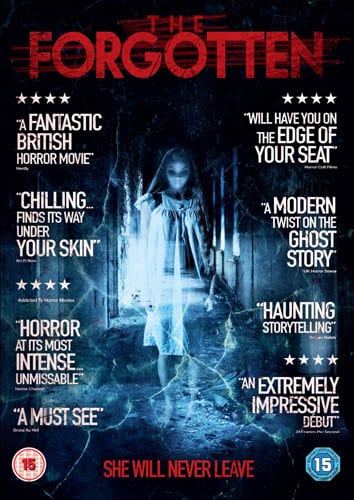 Elarica: My favourite for a horror film, though I wouldn’t necessarily say it’s my favourite but the one that really got me, like “that was scary” – there’s two of them – and that would be The Strangers and… there’s one I found in a box that I was never meant to touch and I put it on when I was a kid and it was called Pumpkinhead. If somebody shows me that, now, I’d love to see it.
Elarica: My favourite for a horror film, though I wouldn’t necessarily say it’s my favourite but the one that really got me, like “that was scary” – there’s two of them – and that would be The Strangers and… there’s one I found in a box that I was never meant to touch and I put it on when I was a kid and it was called Pumpkinhead. If somebody shows me that, now, I’d love to see it.
They did Pumpkinhead 2, didn’t they…
Elarica: They didn’t! [surprised disbelief]
[laughs]
Oliver: There you go!
Elarica: I just know it was the scariest thing I’ve ever seen in my life.
Oliver: It’s so hard not to say something obvious but I’m going to say it. It’s for the same reason, it’s like “don’t watch this film. It’s way too scary for you”. I remember being really young and watching The Shining and just being kind of unable to watch it but unable not to watch it. I’d be watching then I’d stop it and go and get myself a fruit juice because I was about ten or something. But I love it. It’s so good. I’ve seen it hundreds of times but it’s like an education in how to scare people without conforming to formula.
Thank you all very much for your time.
THE FORGOTTEN is available on DVD and digital in the UK now.


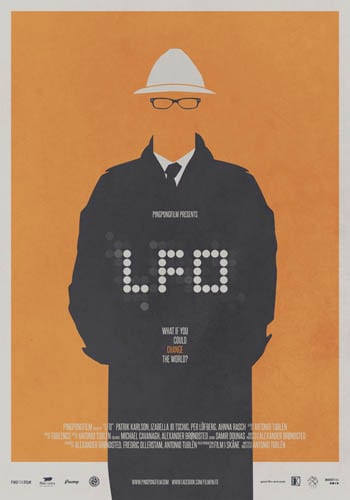


Be the first to comment